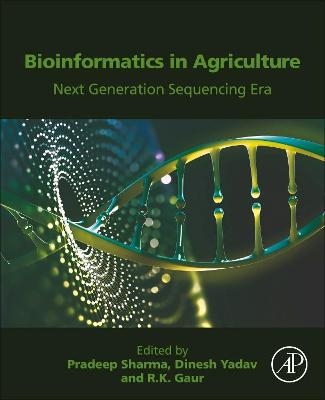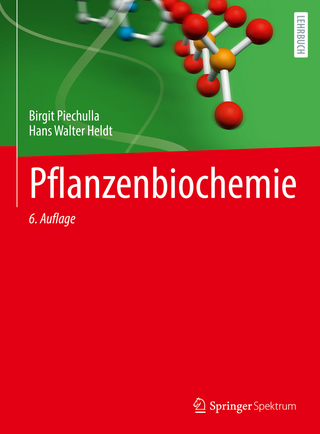
Bioinformatics in Agriculture
Academic Press Inc (Verlag)
978-0-323-89778-5 (ISBN)
Bioinformatics in Agriculture: Next Generation Sequencing Era explores deep sequencing, NGS, genomic, transcriptome analysis and multiplexing, highlighting practices forreducing time, cost, and effort for the analysis of gene as they are pooled, and sequenced. Readers will gain real-world information on computational biology, genomics, applied data mining, machine learning, and artificial intelligence.
This book serves as a complete package for advanced undergraduate students, researchers, and scientists with an interest in bioinformatics.
Dr. Sharma’s research focuses on Agriculture Biotechnology, specifically on the characterization of genes and SSRs for abiotic stresses (drought and heat) and understating the role of epigenetics, Gene silencing and small RNAs in for wheat improvement. He has been associated with several networking projects funded as Agri-Bioinformatics Promotion Program, ACIAR-DST, and DBT-BBSRC, ICAR Networking projects on AMMAS, Cabin and AMAAS schemes etc. He has published 90 peer reviewed papers, editor of six books published in CRC, Elsevier and Academic Press, and 20 book chapters. Dr Sharma has been associated with a recently released bread wheat variety DBW71 and three trait specific genetic and has been awarded with ICAR-Lal Bahadur Shastri Outstanding Young Scientist Award, NAAS- Young Scientist 2007 and ISCA- Pran Vohra Awards. Dr Sharma is Chief Editor of Journal of Cereal Research and editorial of several journals. Prof. Dinesh Yadav is Professor, Department of Biotechnology at D.D.U Gorakhpur University, Gorakhpur, INDIA. Presently he is a coordinator of newly established “Centre for Genomics and Bioinformatics “at D.D.U Gorakhpur University. He was Head, Department of Biotechnology, D.D.U. Gorakhpur University from August 2016 to August 2019. He is also serving as nodal officer IPR cell at DDU Gorakhpur University since Jan 2019. He has also served as Associate Professor in Department of Molecular Biology and Genetic Engineering at G.B Pant University of Agriculture and Technology, Pantnagar from 2006-2009. He has completed his Master Degree in Biotechnology from Devi Ahilya University, Indore in 1996 and Ph.D. from G.B. Pant University of Agriculture and Technology, Pantnagar in 2002. He has more than 19 years of teaching /research experiences. His areas of specialization are Molecular biology, Bioinformatics, Plant biotechnology and Enzyme technology. He has published more than 130 research papers including reviews, books, chapters in Books and proceedings in conferences and more than 230 GenBank accession numbers. He has guided 12 students for Ph.D. in Biotechnology and presently three students are pursuing PhD. He has been mentor for five post-doctoral fellowships namely UGC-Dr. D.S. Kothari (twice), DST-Women Scientist-A DST-Women Scientist-B and SERB-National PDF. He has also supervised 90 students for M.Sc. dissertation/short project work in Biotechnology. He has carried out projects from funding agencies like DBT, UGC, UP Council of Agricultural Research, Lucknow and DST. He has availed DST-BOYSCAST Fellowship at Australian Centre for Plant Functional Genomics (ACPFG), University of Adelaide, South Australia from 3rd May 2012-12th April 2013.He has been awarded Dr. Pushpendra Kumar Gupta Vishisht Krishi Vaigyanik Puraskar-2015 in the field of Agricultural Sciences by Uttar Pradesh Academy of Agricultural Sciences (UPAAS), Lucknow and Young Scientist Award-2008 by Uttarakhand Sate Council of Science & Technology in the discipline Biotechnology, Biochemistry and Microbiology. He is life member of scientific societies namely BRSI, Trivendrum, SBC(I), Bangalore, Indian Science Congress, Association, Calcutta, Society of Plant Biochemistry and Biotechnology, IARI, New Delhi, Association of Microbiologist of India (AMI), New Delhi and UPAAS, Lucknow. He has delivered more than 80 invited talks/ lectures in conference/symposium and also served as Mentor for DST-INSPIRE Science internship camp and Inspire-awards. Presently he is working on Plant specific transcription factor-DOF (DNA binding with One finger) and Nuclear Factor-Y (NF-Y) for developing biotic and abiotic stress tolerance crops and pectinases group of enzymes with potential applications in different industries. His research work has been published in National and International journals of repute like Journal of Experimental Botany, Planta, Theoretical and Applied Genetics, Process Biochemistry, Molecular Biology Reports, Plant Systematics and Evolution, Molecular Biotechnology, Applied Biochemistry and Biotechnology, Annals of Microbiology, Journal of Basic Microbiology, 3 Biotech, Biologia, Journal of Cereal Sciences, Physiology and Molecular Biology of Plants, Biochemistry (Moscow), Current Proteomics, Interdisciplinary Sciences: Computational Life Sciences, Biocatalysis and Agricultural Biotechnology, Cell Biochemistry and Biophysics, Online Journal of Bioinformatics, Chemistry and Ecology, African Journal of Biotechnology, Applied Biochemistry and Microbiology, SugarTech, Enzyme Research etc. Prof. (Dr.) R.K. Gaur earned his Ph.D. in 2005, and is now a Professor at the Department of Biotechnology, Deen Dayal Upadhyaya Gorakhpur University, Gorakhpur, Uttar Pradesh, India. His Ph.D. was on the molecular characterization of sugarcane viruses, i.e., mosaic, streak mosaic, and yellow luteovirus. He received a MASHAV fellowship of the Israeli government for his postdoctoral studies and joined The Volcani Center, Israel and Ben-Gurion University, Negev, Israel. In 2007 he received the Visiting Scientist Fellowship from the Swedish Institute, Sweden to work at Umea° University, Umea°, Sweden. He received a postdoc fellowship from ICGEB, Italy in 2008. He has made significant contributions on sugarcane viruses and has pub lished 130 national/international papers, authored 17 edited books and presented about 50 papers at national and international conferences. He has been honored as a Fellow of Linnean Society, a Fellow of the Royal Society of Biology, a Fellow of the Society of Plant Research, a Fellow of the Society of Applied Biology (FSAB), and a Fellow of the International Society of Biotechnology (FISBT). He has received many other awards, including the Prof. B.M. Johri memorial Award, Society of Plant Research (SPR); Excellent Teaching Award by Astha Foundation, Meerut; UGC-Research Teacher Award; Young Scientist Award in 2012 in Biotechnology by the Society of Plant Research (SPR), Meerut; and Scientific and Applied Research Center Gold Medal Award in 2011 for outstanding contribution in the field of Biotechnology. He has visited several laborato ries in the United States, Canada, New Zealand, United Kingdom, Thailand, Sweden, and Italy. Currently, he is han dling many national and international grants and international collaborative projects on plant viruses and disease management
1. Advances in Agricultural Bioinformatics: Outlook of Multi-Omics Approaches 2. Promises and Benefits ?of Omic approaches to Data driven science industries 3. Bioinformatics intervention in functional genomics: current status and future perspective – An overview 4. Genome informatics: Present status and Future Prospects in agriculture 5. Genomics and its applications for crop improvement why not here crop specific like cotton, musrard, wheat 6. Genome-wide Predictions, Structural and Functional Annotations of Plant Transcription Factor Gene Families: A Bioinformatics Approach 7. Proteomics and their applications to understand the biology of agricultural crops 8. Metabolomics and Sustainable Agriculture: Concepts, Applications and Perspectives 9. Plant Metabolomics: A New Era in the Advancement of Agricultural Research 10. Exploring NGS-based RNA-Seq Transcriptomes of Crops Responding to Abiotic Stress 11. Identification of novel RNAs in plants with the help of Next Generation Sequencing Technologies 12. Molecular Evolution, Three Dimensional Structural Characteristics, Mechanism of Action and Functions of Plant Beta-galactosidases 13. Next generation genomics: toward decoding domestication history of crops 14. In-silico identification of Small RNAs, a tiny silent tool against agriculture pest 15. Bioinformatics-assisted multi-omics approaches to improve the agronomic traits in cotton 16. Omics-assisted Understanding of BPH Resistance in Rice: Current Updates and Future Prospective 17. Contemporary Genomic Approaches in Modern Agriculture for Improving Tomato Varieties 18. Characterization of drought tolerance in maize Omics approaches 19. Deciphering the genomic hotspots in wheat for key breeding traits using comparative and structural genomics 20. Prospects of molecular markers for wheat improvement in post genomic era 21. Omics Approaches for Biotic, Abiotic and Quality Traits Improvement in Potato (Solanum tuberosum L.) 22. Tea plant genome sequencing: prospect for crop improvement through genomics tools 23. Next Generation Sequencing and Viroid Research 24. Computational analysis for plants Virus identification?Using Next Generation Sequencing 25. Microbial degradation of herbicides in contaminated soils by following computational approaches 26. Chloroplast genome and Plant-Virus Interaction 27. Deciphering soil microbiota using metagenomic approach for sustainable agriculture: An overview 28. Concepts and Applications of Bioinformatics for Sustainable Agriculture 29. Application of high throughput structural and functional genomic technologies in crop nutrition research 30. Bioinformatics approach for whole transcriptomics-based marker prediction in agriculture crops 31. Computational approaches towards SNP discovery and its applications in plant breeding 32. Bioinformatics intervention in identification and development of molecular markers: An Overview 33. Deciphering comparative and structural variation that regulates abiotic stress response 34. Deep Learning Applied to Computational Biology and Agricultural Sciences 35. Image processing based artificial intelligence system for rapid detection of plant diseases 36. Uses and Applications of Artificial intelligence and Big Data in agriculture: Smart Farming 37. Artificial Intelligence: The future of Agricultural Sciences
| Erscheinungsdatum | 02.12.2021 |
|---|---|
| Zusatzinfo | 120 illustrations (60 in full color); Illustrations |
| Verlagsort | Oxford |
| Sprache | englisch |
| Maße | 216 x 276 mm |
| Gewicht | 1770 g |
| Themenwelt | Naturwissenschaften ► Biologie ► Biochemie |
| Naturwissenschaften ► Biologie ► Genetik / Molekularbiologie | |
| Technik ► Umwelttechnik / Biotechnologie | |
| Weitere Fachgebiete ► Land- / Forstwirtschaft / Fischerei | |
| ISBN-10 | 0-323-89778-9 / 0323897789 |
| ISBN-13 | 978-0-323-89778-5 / 9780323897785 |
| Zustand | Neuware |
| Haben Sie eine Frage zum Produkt? |
aus dem Bereich


